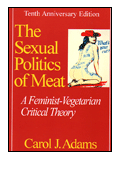 Twilight (2005) is a YA book by Stephanie Meyer, about a young girl (16?) who moves to Fork, Washington, and before long meets a family of vampires at her high school. I don't think I'm ruining it by telling you that she falls in love with one of them. I found Twilight ridiculously addictive, and I read the approx. 500 pages in a matter of days and am fairly thrilled that there are 3 more for me to read.
Twilight (2005) is a YA book by Stephanie Meyer, about a young girl (16?) who moves to Fork, Washington, and before long meets a family of vampires at her high school. I don't think I'm ruining it by telling you that she falls in love with one of them. I found Twilight ridiculously addictive, and I read the approx. 500 pages in a matter of days and am fairly thrilled that there are 3 more for me to read. Like the vampire tales that came before, Meyer borrows some vampire rules (blood drinking), explains away others, and invents her own (turns out they can go in the sun!). It's difficult not to compare this book to the Buffy the Vampire series, in which a human girl also falls in love with a vampire. A better metaphor for dating the ultimate bad-boy, I can't imagine. The beloved vampires in both Twilight and Buffy (Edward & Angel) are "good" vampires, meaning they don't kill humans for food, which doesn't mean that they don't LONG for blood. As a result, the table is turned on the classic teenage conflict to control their "urges" - rather than trying hard not to have sex, the vampire has to try really hard not to suck the blood of his human girlfriend. It leads to some highly confused snuggling.
 I'm simultaneously reading this book called The Sexual Politics of Meat: A Feminist-Vegetarian Critical Theory (don't laugh, it's really amazing!) by Carol J Adams (1999). Adams makes a compelling case that the patriarchy and meat eating are closely tied, and that women and animals that are eaten are both objectified and denied their humanity (or acknowledgment as sentient beings) and that's why our society is so violent (especially toward women). She calls this the "absent referent", because the being (woman or animal) is objectified to the point beyond which they're acknowledged as beings (ie., we refer to "meat", not say, "a cow", or even "a piece of ass" instead of "a woman".) Much more on this later after I finish it - anywho, Twilight is practically chapter two of Adams book, where the woman is someone who is treated "like a piece of meat" and the vampire (insert teenage bad-boy) literally wants to eat her. Huh.
I'm simultaneously reading this book called The Sexual Politics of Meat: A Feminist-Vegetarian Critical Theory (don't laugh, it's really amazing!) by Carol J Adams (1999). Adams makes a compelling case that the patriarchy and meat eating are closely tied, and that women and animals that are eaten are both objectified and denied their humanity (or acknowledgment as sentient beings) and that's why our society is so violent (especially toward women). She calls this the "absent referent", because the being (woman or animal) is objectified to the point beyond which they're acknowledged as beings (ie., we refer to "meat", not say, "a cow", or even "a piece of ass" instead of "a woman".) Much more on this later after I finish it - anywho, Twilight is practically chapter two of Adams book, where the woman is someone who is treated "like a piece of meat" and the vampire (insert teenage bad-boy) literally wants to eat her. Huh. One frustrating thing about Twilight is that, as it reads as a very old fashioned romance novel (think du Maurier or Brontë), the characters also fit into these very old-fashioned gender roles. I found this mildly disturbing for a contemporary YA book obviously targeted toward young women, and I hope that as the story progresses, the lead character breaks out of her victimized state and becomes more powerful. I think it's a lot more fun to see the classic tales subverted, and instead of waiting for her knight to come and save her, the young woman takes care of business herself.


3 comments:
I read the Meyer trilogy last summer and had much the same thoughts re: the gender roles. While the "bad boy" vampire thing obviously has allure, I'm troubled with the way it confuses intimacy and such extreme physical danger--the couple aren't just policing themselves vis a vis sex and its attendant risks, but one wrong move could mean, uh, death for the girl partner.
The author is also Mormon, which I think brings interesting religious narratives into play when it comes to the meaning of sexuality and marriage in the books.
The tensions over all of this, and the explicitly gendered narrative, haven't been resolved in the series so far and I'll be interested to see what the 4th book brings us!
Oh, you are so going to love what's ahead for Bella and Edward. Eventually the three books will run together and you won't remember what happened when.
It's funny that it parellel's Buffy, I wonder if the author was a fan of that show. I can't wait to check out that series.
I totally agree about the old-fashioned roles, but I won't tell you how the characters develop.
Adams book reminds me of Mary Wollstonecraft's "Petition on Human Rights". A beautiful piece explaining how the irrationality of love has made women objects to be thought of as weak and are objectified. Twilight makes me think of it as well, and not in a good way. I really might have to pick up Adams book to add to my collection of Feminist Critical Theory.
Post a Comment